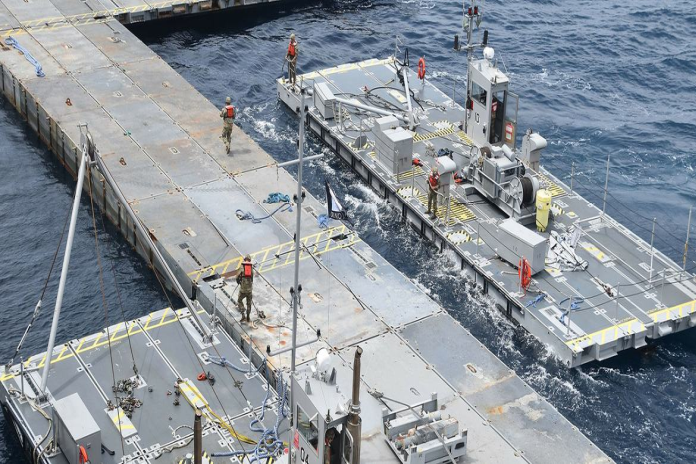GAZA CITY, Gaza – Trucks carrying desperately needed aid into Gaza have started moving ashore on the temporary floating dock built by the United States military, but this is not enough to meet the needs of civilians, UN humanitarian affairs office, OCHA, said on Friday.
OCHA warned that the maritime corridor cannot replace critical land routes, which are the quickest and most effective way of delivering humanitarian aid in the besieged enclave, where more than two million Palestinians desperately need food, shelter and other assistance.
“Any and all aid into Gaza is welcome by any route,” Spokesperson Jens Laerke told reporters in Geneva. “But, it is an addition, and it doesn’t take away the fact that land crossings will be more important.”
Additional aid route
The US military’s Central Command announced that the trucks began rolling at approximately 9:00 am, local time, on Friday, and that no troops went ashore.
The floating dock was anchored to a beach in Gaza the previous day. With most border crossings to the enclave closed or unsafe, it will provide an additional path for aid delivery to the embattled enclave.
The United Nations welcomes any effort towards ensuring that aid reaches Gaza, said UN Deputy Spokesperson Farhan Haq, speaking in New York later on Friday.
“As such, we are grateful to the United States, as well as to Cyprus, with the support of other Member States, to sustain the maritime corridor as an additional route for aid to Gaza,” he said.
He explained that “after months of discussions with all relevant authorities, the UN has agreed to support in receiving and arranging for the dispatch of aid into Gaza from the floating dock, as long as it respects the neutrality and independence of humanitarian operations.”
Open all crossings
Laerke said UN agencies are finalising their readiness plans for handling the aid once the floating dock is properly functioning, keeping in mind the need to ensure the safety of staff.
“Community awareness and acceptance is paramount to ensure the safety and security of this operation,” he insisted.
“However, getting aid to people in need into and across Gaza cannot and should not depend on a floating dock far from where needs are most acute,” he said.
“Land routes are the most viable, effective and efficient aid delivery method, which is why we need all crossing points to be opened.”

Rafah displacement continues
Updating on the situation in Rafah, OCHA reported that nearly 640,000 people have been displaced from the area since the Israeli military offensive began. Many have fled to overcrowded Deir al Balah governorate in central Gaza, where conditions are dire.
The ongoing influx of displaced people there, and in Khan Younis, continues to strain humanitarian response, which is already overstretched.
OCHA said teams working on getting food to people in Gaza report that only five bakeries remain operational across the enclave – four in Gaza city and one in Deir al Balah. Nearly a dozen others have stopped working due to fuel and supply shortages, amid ongoing hostilities.
As a result, aid partners have been forced to conduct small-scale distributions with limited stocks, providing reduced rations and prioritizing Khan Younis and Deir al Balah.
Water and sanitation crisis
The ongoing displacement from Rafah to Khan Younis has exacerbated the water and sanitation crisis, with sewage overflow and solid waste spreading across roads, displacement camps, and the rubble of destroyed homes – with a catastrophic impact on health.
“Our colleagues working on ensuring that people in Gaza have adequate shelter say there are no remaining stocks of shelter materials inside Gaza,” OCHA said.
Fuel shortage
Meanwhile, the World Health Organization (WHO) stressed that the biggest issue now is fuel.
Spokesperson Tarik Jašarević reported that only 13 out of 36 hospitals in Gaza are now partially functioning, emphasizing that fuel is required for electricity and to run generators.
He said health partners require between 1.4 million to 1.8 million litres monthly so that hospitals can function, but only 159,000 litres have entered Gaza since the border closure, “and that’s clearly not sufficient.”





